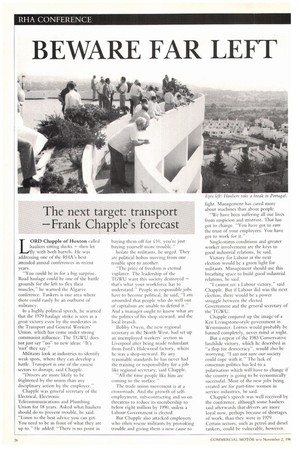The next target: transport —Frank Chapple's forecast
Page 28

If you've noticed an error in this article please click here to report it so we can fix it.
LORD Chapple of Hoxton called hauliers sitting ducks — then let fly with both barrels. He was addressing one of the RI-IA's best attended annual conferences in recent years.
"You could be in for a big surprise. Road haulage could be one of the battle grounds for the left to flex their muscles,." he warned the Algarve conference. Tankers is one area where there could easily be an outburst of militancy.
In a highly political speech, he warned that the 1979 haulage strike is seen as a great victory even by the moderates in the Transport and General Workers' Union, which has come under strong communist influence. The TGWU does not just say "no" to new ideas: "It's `nice they say."
Militants look at industries to identify weak spots, where they can develop a battle. Transport is one of the easiest sectors to disrupt, said Chapple.
"Drivers are more likely to be frightened by the union than any disciplinary action by the employer."
Chapple was general secretary of the Electrical, Electronic Telecommunications and Plumbing Union for 18 years. Asked what hauliers should do to prevent trouble, he said: "Listen to the best advice you can get. You need to be in front of what they are up to." He added: "There is no point in
buying them off for 1:10, you're just buying yourself more trouble."
Isolate the militants, he urged. They are political hobos moving from one trouble spot to another.
"The price of freedom is eternal vigilance. The leadership of the
TGWU want this society destroyed — that's what your workforce has to understand.People in responsible jobs have to become political, he said, "I am astounded that people who do well out of capitalism are unable to defend it.” And a manager ought to know what are the politics of his shop steward, and the local branch.
Bobby Owen, the new regional secretary in the North West, had set up an unemployed workers' section in Liverpool after being made redundant from Ford's Halewood factory, where he was a shop-steward. By any reasonable standards he has never had the training or responsibility for a job like regional secretary, said Chapple.
"All the time people like him are coming to the surface."
The trade union movement is at a cross-roads. And the growth of selfemployment, sub-contracting and so on threatens to reduce its membership to below eight million by 1990, unless a Labour Government is elected.
But Chapple also attacked employers who often rescue militants by provoking trouble and giving them a new cause to fight. Management has cared more about machines than about people.
"We have been suffering all our lives from suspicion and mistrust. That has got to change. "You have got to earn the trust of your employees. You have got to work for it."
Single-status conditions and greater worker involvement arc the keys to good industrial relations, he said.
Victory for Labour at the next election would be a green light for militants. Management should use this breathing space to build good industrial relations, he said.
"I cannot see a Labour victory," said Chapple. But if Labour did win the next election, there would be a power struggle between the elected Government and the general secretary of the TGWU.
Chapple conjured up the image of a Ken Livingstone-style government in Westminster. Lorries would probably be banned completely, never mind at night.
But a repeat of the 1983 Conservative landslide victory, which he described as "a flop for democracy", would also he worrying. "I am not sure our society could cope with it." The lack of consensus politics has led to a polarisation which will have to change if the country is going to be economically successful. Most of the new jobs being created are for part-time women in service industries, he said.
Chapple's speech was well received by the conference, although some hauliers said afterwards that drivers are more loyal now, perhaps because of shortages of work, than they were in 1979. Certain sectors, such as petrol and diesel tankers, could be vulnerable, however.












































































































